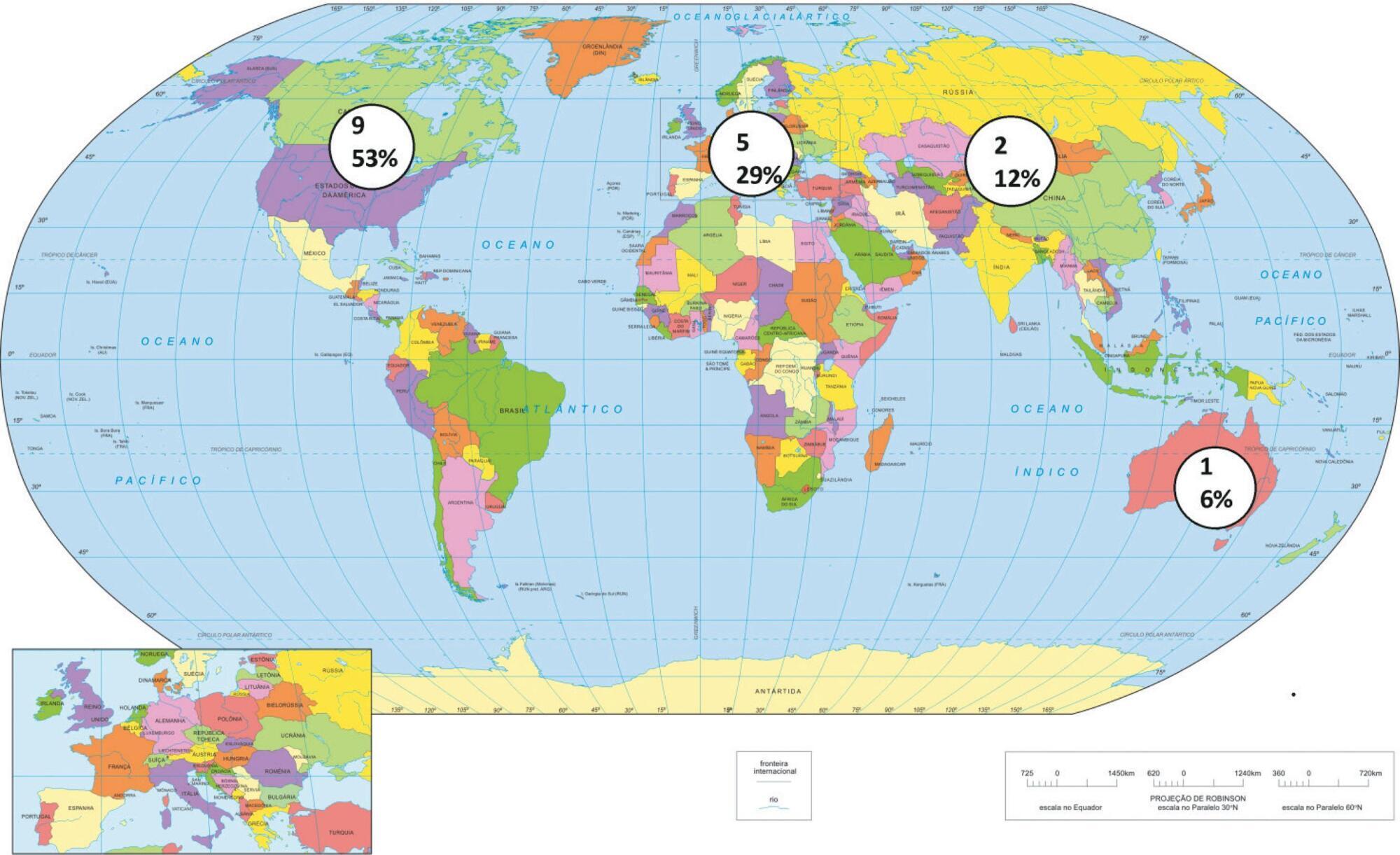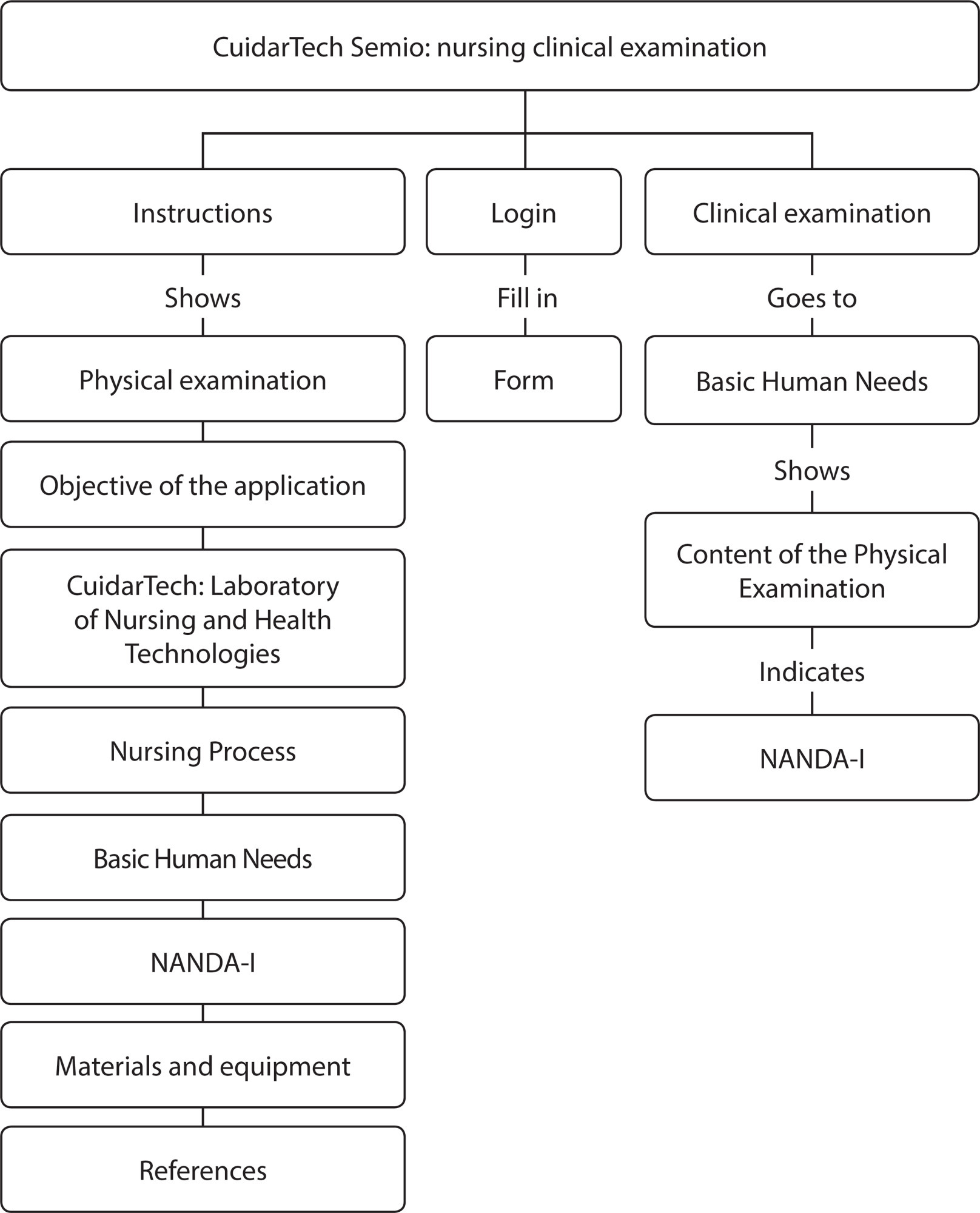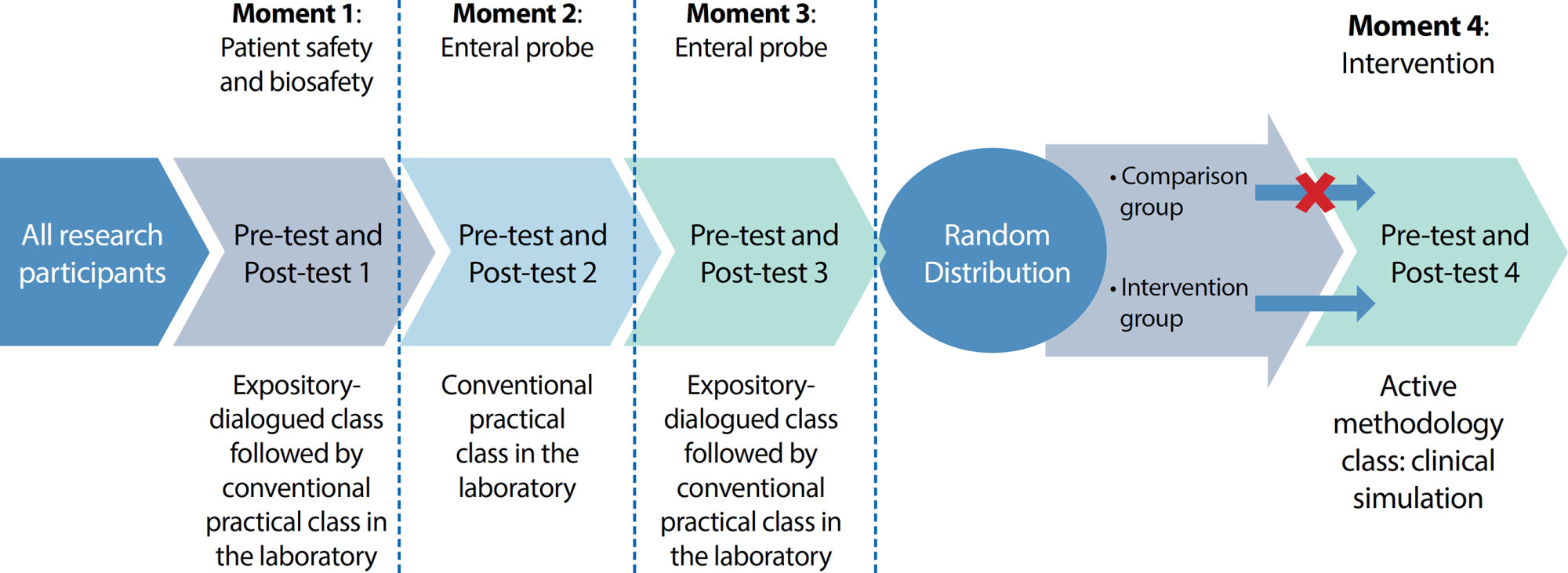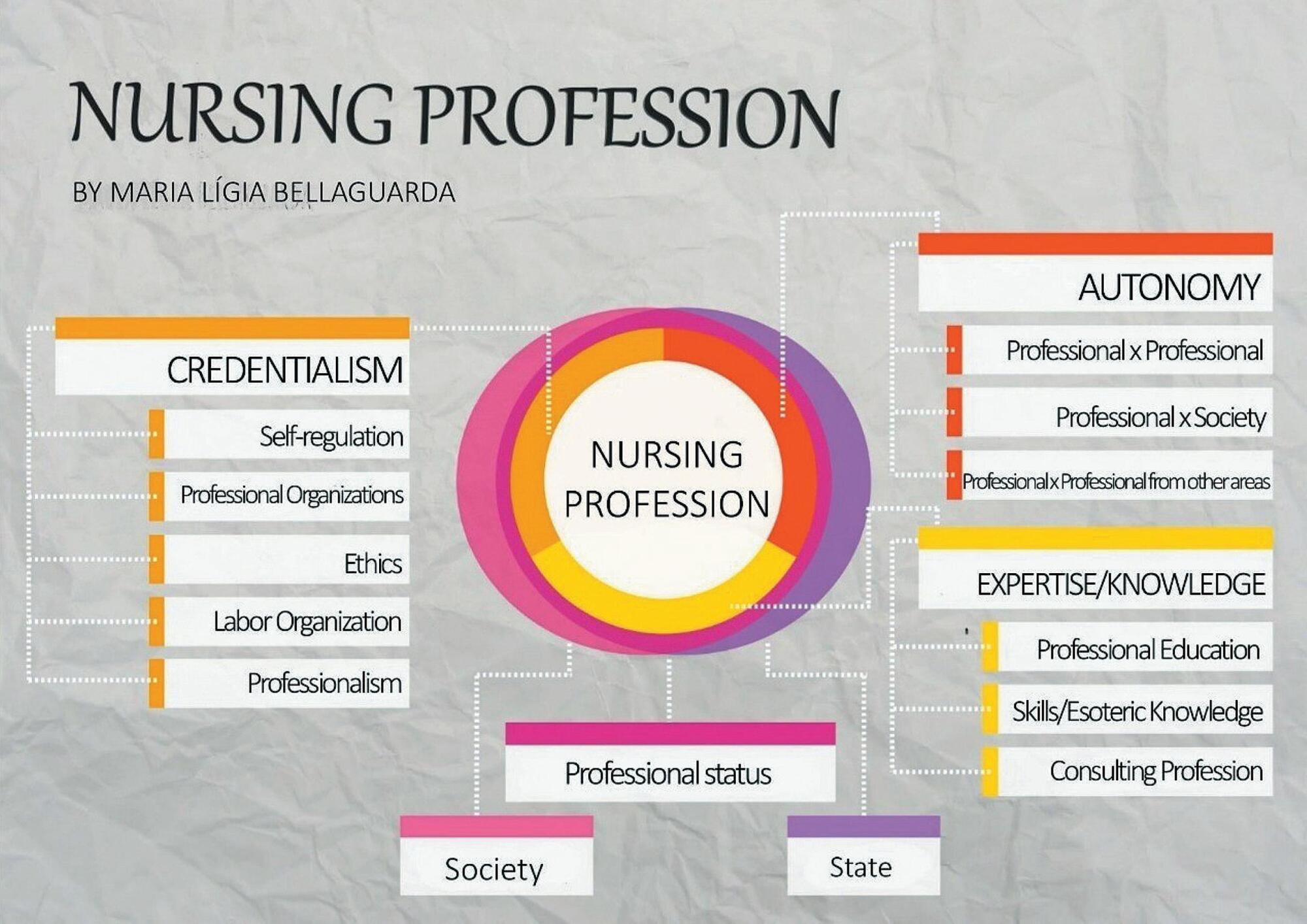-
REFLECTION
Research lines in nursing: phylosophical and epistemological highlights
Revista Brasileira de Enfermagem. 2015;68(4):723-729
01-01-2015
Abstract
REFLECTIONResearch lines in nursing: phylosophical and epistemological highlights
Revista Brasileira de Enfermagem. 2015;68(4):723-729
01-01-2015DOI 10.1590/0034-7167.2015680421p
Views0See moreRESUMEN
Objetivo:
elucidar destaques filosóficos y epistemológicos mediante consideraciones en favor de la casualidad de cuestiones en el interés de la Enfermería.
Método:
es fundamentado en las proposiciones teóricas de Johannes Hessen y de otros autores consagrados.
Resultados:
clareamiento de aspectos sustantivo e implicaciones adjetivas no sólo el interés de la investigación, resaltando los significados esenciales del asunto coincidido con las elaboraciones de disertaciones y tesis (Maestría y Doctorado de Enfermería).
Conclusión:
texto representa una contribución valiosa para esclarecer mejor detalles de la construcción del conocimiento en la temática y problemática del asunto puesto en causa.
-
REVIEW
Using the theory of meaningful learning in nursing education
Revista Brasileira de Enfermagem. 2015;68(4):713-722
01-01-2015
Abstract
REVIEWUsing the theory of meaningful learning in nursing education
Revista Brasileira de Enfermagem. 2015;68(4):713-722
01-01-2015DOI 10.1590/0034-7167.2015680420i
Views0See moreABSTRACT
Objective:
to synthesize the scientific literature about the Theory of Meaningful Learning in the process of teaching and learning in nursing.
Method:
this is an integrative review conducted in the databases MEDLINE, LILACS, SciELO, BDENF and CINAHL with studies addressing the subject or aspects of the theory of meaningful learning of David Ausubel. Ten studies were included, from which six were written in Portuguese and four in English, published from 1998 to 2013.
Results:
five studies used the theory of meaningful learning, four studies cited Ausubel as the author of this theory and only two studies followed the framework for the application of the theory completely. There are only a few studies on this subject and those which explore it are not correlated with Ausubel’s theory.
Conclusion:
it is necessary to break with the dichotomy between theory and practice and promote the articulation of content with action, introducing the student as the author of their own knowledge.

-
REVIEW
Nursing scientific production on health promotion, chronic condition, and aging
Revista Brasileira de Enfermagem. 2015;68(4):705-712
01-01-2015
Abstract
REVIEWNursing scientific production on health promotion, chronic condition, and aging
Revista Brasileira de Enfermagem. 2015;68(4):705-712
01-01-2015DOI 10.1590/0034-7167.2015680419i
Views0See moreABSTRACT
Objective:
to characterize the scientific production of Postgraduate Programs Nursing in Brazil on health promotion with a focus on elderly people with chronic conditions in the period from 2006 to 2010.
Method:
integrative research developed by searching for dissertations and theses in the database of the Center for Nursing Studies and Research of the Brazilian Nursing Association published in the period from 2006 to 2010 and which focused on health promotion for elderly people with chronic conditions.
Results:
five themes emerged: “Living with the disease”; “Technologies of care”, “Potential for self-care” “Psycho-spiritual dimension”, and “Family caregiver”.
Conclusion:
it was possible to identify nursing care as a key element to promote the health of elderly people and make them more independent in their care so as to live with their limitations or disabilities, even when affected by chronic diseases.

-
RESEARCH
Longevity according to life histories of the oldest-old
Revista Brasileira de Enfermagem. 2015;68(4):697-704
01-01-2015
Abstract
RESEARCHLongevity according to life histories of the oldest-old
Revista Brasileira de Enfermagem. 2015;68(4):697-704
01-01-2015DOI 10.1590/0034-7167.2015680418i
Views0See moreABSTRACT
Objective:
to interpret life histories of the oldest-old in a community, grounded on the perspective of the Active Aging and Life Course.
Method:
this is a qualitative research. Participants included twenty seniors 80 years and older, users of a Basic Health Unit. Life histories were collected and analyzed according to the proposition of the Autobiographical Narrative Interview.
Results:
during the analytic process, elements found in the elders’ present and past arose, contributing to the development of a theoretical model: “Building longevity along the life course.”
Conclusion:
longevity is rooted in the past, strongly infl uenced by the family culture and life course; assumptions of the Active Aging are more meaningful in the informants’ present trajectory. The content of the narratives pointed to new possibilities of Gerontology Nursing intervention in Primary Care, aiming at health promotion and intervention, specially grounded on the respect to the oldest-elders’ culture.

-
RESEARCH
Accuracy in inference of nursing diagnoses in heart failure patients
Revista Brasileira de Enfermagem. 2015;68(4):690-696
01-01-2015
Abstract
RESEARCHAccuracy in inference of nursing diagnoses in heart failure patients
Revista Brasileira de Enfermagem. 2015;68(4):690-696
01-01-2015DOI 10.1590/0034-7167.2015680417i
Views0See moreABSTRACT
Objective:
to determine the accuracy of nursing diagnoses of fatigue, intolerance to activity and decreased cardiac output in hospitalized HF patients.
Method:
descriptive study applied to nurses with experience in NANDA-I and/or HF nursing diagnoses. Evaluation and accuracy were determined by calculating effi cacy (E), false negative (FN), false positive (FP) and trend (T) measures. Nurses who showed acceptable inspection for two diagnoses were selected.
Results:
the nursing diagnosis of fatigue was the most commonly mistaken diagnosis identifi ed by the nursing evaluators.
Discussion:
the search for improving diagnostic accuracy reaffi rms the need for continuous and specifi c training to improve the diagnosis capability of nurses.
Conclusion:
the training allowed the exercise of clinical judgment and better accuracy of nurses.
-
RESEARCH
Direct cost of development and documentation of the nursing process
Revista Brasileira de Enfermagem. 2015;68(4):683-689
01-01-2015
Abstract
RESEARCHDirect cost of development and documentation of the nursing process
Revista Brasileira de Enfermagem. 2015;68(4):683-689
01-01-2015DOI 10.1590/0034-7167.2015680416i
Views0See moreABSTRACT
Objective:
identify the average direct cost (ADC) of the activities performed by nursing professionals in the nursing process development and documentation at the medical clinic of a teaching hospital.
Method:
1040 activities were observed and the ADC was calculated by multiplying the time spent by professionals by the unit cost of direct labor.
Results:
the ADC of patient admission was R$ 55.57 (SD=19.44); among the activities of patient follow-up, the assessment phase documentation had the most significant ADC (R$ 17.70 – SD=14.60); the ADC of descriptive records corresponded to R$ 1.21 (SD=1.21) and the ADC of the nursing team for shift change was R$ 54.23 (SD=28.95).
Conclusion:
the study promotes visibility of the work performed by nursing professionals in the development of the nursing process, providing financial data to ensure consistent arguments for proper resources to its feasibility.
-
RESEARCH
Health status and mental health in patients after percutaneous coronary intervention
Revista Brasileira de Enfermagem. 2015;68(4):676-682
01-01-2015
Abstract
RESEARCHHealth status and mental health in patients after percutaneous coronary intervention
Revista Brasileira de Enfermagem. 2015;68(4):676-682
01-01-2015DOI 10.1590/0034-7167.2015680415i
Views0See moreABSTRACT
Objective:
to assess the association between perceived health status and the mental health of patients submitted to percutaneous coronary intervention after hospital discharge.
Method:
a quantitative and cross-sectional study involving 101 participants. The following instruments were used: a sociodemographic and clinical characterization instrument, the Medical Outcomes Study 36-Item Short-Form Health Survey (SF-36), and the Hospital Anxiety and Depression Scale (HADS). Participants were divided into three groups: no anxiety and no depression (G1); anxiety or depression (G2); and both (G3). The ANOVA test was used for the intergroup comparison of means on the SF-36 domains.
Results:
There was an association between perceived health status and mental health. The participants in G1 presented higher scores in all SF-36 domains in comparison with participants in G2 and G3.
Conclusion:
Participants with no anxiety and depression presented better-perceived health status in comparison with those with anxiety or depression, or both.
-
RESEARCH
Analysis of the decision-making process of nurse managers: a collective refl ection
Revista Brasileira de Enfermagem. 2015;68(4):668-675
01-01-2015
Abstract
RESEARCHAnalysis of the decision-making process of nurse managers: a collective refl ection
Revista Brasileira de Enfermagem. 2015;68(4):668-675
01-01-2015DOI 10.1590/0034-7167.2015680414i
Views0ABSTRACT
Objective:
to analyze the decision-making model adopted by nurses from the perspective of some decision-making process theories.
Method:
qualitative approach, based on action research. Semi-structured questionnaires and seminars were conducted from April to June 2012 in order to understand the nature of decisions and the decision-making process of nine nurses in position of managers at a public hospital in Southern Brazil. Data were subjected to content analysis.
Results:
data were classified in two categories: the current situation of decision-making, which showed a lack of systematization; the construction and collective decision-making, which emphasizes the need to develop a decision-making model.
Conclusion:
the decision-making model used by nurses is limited because it does not consider two important factors: the limits of human rationality, and the external and internal organizational environments that infl uence and determine right decisions.
Keywords:Decision Support PracticesNursingNursing Administration ResearchPractice ManagementProfessional CompetenceSee more
-
REVIEW
Mental health interventions implemented in the COVID-19 pandemic: what is the evidence?
Revista Brasileira de Enfermagem. 2021;74:e20200635
06-11-2021
Abstract
REVIEWMental health interventions implemented in the COVID-19 pandemic: what is the evidence?
Revista Brasileira de Enfermagem. 2021;74:e20200635
06-11-2021DOI 10.1590/0034-7167-2020-0635
Views0See moreABSTRACT
Objective:
to map the evidence on mental health interventions implemented during the COVID-19 pandemic.
Method:
this scoping review was carried out in the MEDLINE/PubMed, SCOPUS, Web of Science, PsycINFO, and Science Direct databases and in the medRxiv, bioRxiv, and PsyArXiv preprints servers using the descriptors “Covid-19”, “coronavirus infection”, “coronavirus”, “2019-nCoV”, “2019 novel coronavirus disease”, “SARS-CoV-2”, “health personnel”, “general public”, and “mental health”.
Results:
eight articles were selected and categorized into mental health interventions for the population, among which mental health interventions were for people diagnosed with suspicion/confirmed COVID-19 and mental health interventions for health professionals.
Conclusion:
telemonitoring, virtual games and strategies focused on social support and muscle relaxation techniques, characterized as non-pharmacological and low-cost, were shown as interventions, which, since they are effective, need to be encouraged and included in mental health care practices.

-
Nursing performance in robotic surgeries: integrative review
Revista Brasileira de Enfermagem. 2019;72(3):795-800
06-07-2019
Abstract
Nursing performance in robotic surgeries: integrative review
Revista Brasileira de Enfermagem. 2019;72(3):795-800
06-07-2019DOI 10.1590/0034-7167-2018-0426
Views0ABSTRACT
Objective:
To know the scientific production on the performance of the nursing staff in robotic surgeries, identifying the role of the nurse in the three perioperative periods.
Methods:
Integrative review, search in the databases National Library of Medicine, National Institutes of Health, Scientific Electronic Library Online and Biblioteca Virtual em Saúde, performed from June to September, 2017; 17 selected articles met the inclusion criteria.
Results:
Most articles were published in foreign journals in English, nine in the United States, classified with evidence level of 4 and 5. The role of nursing in the perioperative period was identified, related mainly to patient safety. The most mentioned perioperative period in the articles was the intraoperative, with greater concern in the positioning of the patient.
Conclusion:
The nursing performance and patient safety in robotic surgeries are similar to the ones in major surgeries, requiring from the patient a specific knowledge on the setting and preparation of the robot.
Keywords:Nurse's RolePerioperative NursingRoboticsSurgical Procedures, OperativeTechnological DevelopmentSee more
-
ORIGINAL ARTICLE
“Waiting for a miracle”: Spirituality/Religiosity in coping with sickle cell disease
Revista Brasileira de Enfermagem. 2019;72(6):1554-1561
10-21-2019
Abstract
ORIGINAL ARTICLE“Waiting for a miracle”: Spirituality/Religiosity in coping with sickle cell disease
Revista Brasileira de Enfermagem. 2019;72(6):1554-1561
10-21-2019DOI 10.1590/0034-7167-2018-0635
Views0See moreABSTRACT
Objective:
To understand spirituality/religiosity as experienced by people with sickle cell disease, and its influence on coping with the disease.
Method:
A qualitative, descriptive, and exploratory study conducted in the State of Bahia. Twenty-nine respondents participated in semi-structured interviews. Content analysis was used to analyze the empirical material.
Results:
Individuals with sickle cell disease experience spirituality/religiosity motivated by their hope for a miracle, and fear of death; among their rites are: reading religious materials, individual and group prayer, and attendance at worship services. The effects on their health include: comfort by means of coping by comparing two evils, anxiety relief, social support, and lifestyle changes; however, spirituality/religiosity may be impaired.
Final considerations:
This study demonstrates the need to qualify health professionals to address spiritual issues of these individuals during illness, with the aims of diagnosing suffering and anguish, and providing care, comfort and strengthening of the spiritual bonds of these individuals.
-
ORIGINAL ARTICLE
Construction and validation of a mobile application for development of nursing history and diagnosis
Revista Brasileira de Enfermagem. 2020;73:e20190674
12-21-2020
Abstract
ORIGINAL ARTICLEConstruction and validation of a mobile application for development of nursing history and diagnosis
Revista Brasileira de Enfermagem. 2020;73:e20190674
12-21-2020DOI 10.1590/0034-7167-2019-0674
Views0ABSTRACT
Objectives:
to describe the construction and validation process for a mobile application for development of the nursing history and diagnosis.
Methods:
methodological study conducted in 2018 in three stages: content creation, based on the Basic Human Needs categories and nursing diagnoses; content assessment by nine nursing judges, with calculation of the content validity index; and construction of the application, which included definition of the requirements, a conceptual map, implementation and prototyping options, tests and implementation.
Results:
the application was organized by sections: Grouped Basic Human Needs, Cranial pair tests, Clinical assessment scales and Additional tests. Two section were adjusted according to the judges’ suggestions.
Final Considerations:
it is the first application produced in Brazil based on the Basic Human Need categories, which enables quick access to information, concepts and typical nomenclatures of semiology, recording of clinical data and definition of nursing diagnoses.
Keywords:Educational TechnologyMobile ApplicationsNursing InformaticsNursing ProcessPhysical ExaminationSmartphoneSee more
-
ORIGINAL ARTICLE
Factors associated with vulnerability and fragility in the elderly: a cross-sectional study
Revista Brasileira de Enfermagem. 2022;75(2):e20200399
10-01-2022
Abstract
ORIGINAL ARTICLEFactors associated with vulnerability and fragility in the elderly: a cross-sectional study
Revista Brasileira de Enfermagem. 2022;75(2):e20200399
10-01-2022DOI 10.1590/0034-7167-2020-0399
Views0See moreABSTRACT
Objectives:
to assess factors associated with vulnerability and fragility in the elderly.
Methods:
crosssectional study with 384 elderly people in Fortaleza, Ceará. The Vulnerable Elders Survey and Clinical-Functional Vulnerability Index – 20 were used. Chi-square and Fisher’s exact tests were used for associations. In the analysis of the combined influence of risk factors, the stepwise logistic regression and multinomial regression methods were adopted.
Results:
251 (65.4%) non-vulnerable and 133 (34.6%) vulnerable elders. From the vulnerable elders analyzed, 42 (30.9%) are at high risk for frailty. Factors associated with vulnerability: age, gender, presence of comorbidities, hypertension, diabetes, osteoporosis and use of polypharmacy. There is a 30% increase in the chance of vulnerability for each additional drug. Physical activity reduces the chance of vulnerability by 60%. Factors associated with frailty: educational level; self-perception of health; comorbidities; polypharmacy.
Conclusions:
it is important to pay attention to the presence of arterial hypertension, osteoporosis, polypharmacy, and encourage the practice of physical activity.
-
ORIGINAL ARTICLE
Caring ability, burden, stress and coping of family caregivers of people in cancer treatment
Revista Brasileira de Enfermagem. 2019;72(6):1541-1546
10-21-2019
Abstract
ORIGINAL ARTICLECaring ability, burden, stress and coping of family caregivers of people in cancer treatment
Revista Brasileira de Enfermagem. 2019;72(6):1541-1546
10-21-2019DOI 10.1590/0034-7167-2018-0605
Views0See moreABSTRACT
Objective:
To analyze the association between the caring ability and the burden, stress and coping of family caregivers of people in cancer treatment.
Method:
A cross-sectional study with 132 family caregivers. The following instruments were applied: a characterization instrument, the Caring Ability Inventory, the Zarit Burden Interview, the Perceived Stress Scale, and the Brief COPE. The Spearman Correlation was used with significance ≤5%.
Results:
There were significant and positive correlations between total caring ability and: burden – interpersonal relationship (p=0.03); stress (p=0.02) and maladaptive coping (p=0.00); and inversely proportional correlations with problem-focused coping (p=0.03). The courage had inversely proportional correlation with: self-efficacy (p=0.03), interpersonal relationship (p=0.00), stress (p=0.04) and maladaptive coping (p=0.00). The knowledge had significant and positive correlation with problem-focused coping (p=0.00), adaptive coping (p=0.01), and inverse correlation with stress (p=0.02).
Conclusion:
The level of caring ability correlates with levels of stress and burden, and with the type of coping strategy used by family caregivers.
-
ORIGINAL ARTICLE
Clinical simulation as a Nursing Fundamentals teaching method: a quasi-experimental study
Revista Brasileira de Enfermagem. 2022;75(2):e20201155
10-18-2022
Abstract
ORIGINAL ARTICLEClinical simulation as a Nursing Fundamentals teaching method: a quasi-experimental study
Revista Brasileira de Enfermagem. 2022;75(2):e20201155
10-18-2022DOI 10.1590/0034-7167-2020-1155
Views0See moreABSTRACT
Objectives:
to evaluate students’ knowledge gain after the implementation of clinical simulation in Nursing Fundamentals disciplines.
Methods:
a quasi-experimental intervention was carried out with 60 students, distributed in comparison and intervention groups, who underwent traditional teaching and traditional teaching associated with simulated teaching, respectively. Pre-test and post-test instruments were applied to both groups.
Results:
after analyzing the students’ performance through the applied instruments, both groups had a cognitive evolution along with the taught content, however, when compared, the intervention group obtained a higher knowledge gain than the comparison group (p = 0.016), demonstrating progressive and increasing improvement with the use of the methodology.
Conclusions:
simulated teaching significantly helps students in gaining technical-cognitive knowledge. Therefore, it is recommended to adhere to the use of this methodology for teaching Nursing Fundamentals.

-
ORIGINAL ARTICLE
Eliot Freidson’s sociology of professions: an interpretation for Health and Nursing
Revista Brasileira de Enfermagem. 2020;73(6):e20180950
08-10-2020
Abstract
ORIGINAL ARTICLEEliot Freidson’s sociology of professions: an interpretation for Health and Nursing
Revista Brasileira de Enfermagem. 2020;73(6):e20180950
08-10-2020DOI 10.1590/0034-7167-2018-0950
Views0See moreABSTRACT
Objectives:
to analyze theoretical conceptions of Eliot Freidson’s Sociology of Professions scoped on health and nursing professions.
Methods:
Eight nurses were interviewed, all involved in the development of the professional Council on the timeframe from 1975 to 1986. Documental resources were Laws, Ordinances, Resolutions, Reports, Meeting Minutes and Public Deeds. Information was organized as from literature and Eliot Freidson’s conceptions, and thematic content analysis was carried out.
Results:
the concepts authored by Eliot Freidson allowed for the development of a concept chart that portrays the nursing profession and that may be expanded for the other occupations in the health field, in consonance with professional organization in the country.
Final Considerations:
Eliot Freidson’s framework, in interpretation for nursing, consolidates the profession with relative autonomy, expertise by Nursing Care Systematization and credentialism by professional normalizations.

Search
Search in:
Nuvem de Tags
Aged (144) Atenção Primária à Saúde (239) COVID-19 (104) Cuidados de Enfermagem (269) Educação em Enfermagem (151) Educação em Saúde (139) Enfermagem (930) Estudos de Validação (131) Health Education (144) Idoso (208) Mental Health (149) Nursing (987) Nursing Care (306) Patient Safety (151) Primary Health Care (284) Qualidade de Vida (104) Quality of Life (106) Saúde Mental (145) Segurança do Paciente (150) Validation Studies (108)



